St Petersberg
(Please note: if you would prefer to
listen to the audio, click the Podcast link to the right.)
Let’s start at the top. I think this is a fantastic place, and I shall be going back.
The gulf of Finland is a bit of an awkward place. The sea appears to be shallow. The entrance to Helsinki is festooned with islands, and not just within spitting distance of the coast. Several miles out you spot what you think is a submarine basking on the surface only to find it’s another tiny rock sticking out of the sea.
Further east, there are more islands, and the entry to St Petersburg is lined with islands created from the dredging of a sea lane.
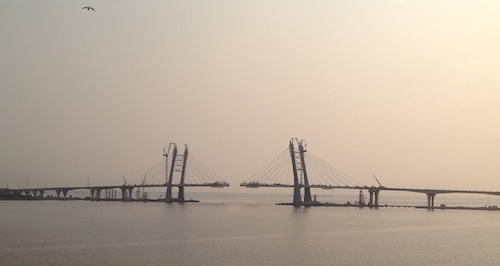
Russia's window on the west
Of course, the city was built on marshland, hence many canals were originally dug to help drain as much of the land as possible. This problem with the water level does give the city a slight problem: it does have a certain smell. In parts of the city there is a distinct nautical smell of tarred ships’ bilges. In other areas, the smell is more akin to sewage. Luckily, this is not oppressive, and it is the only criticism I can find of the city.
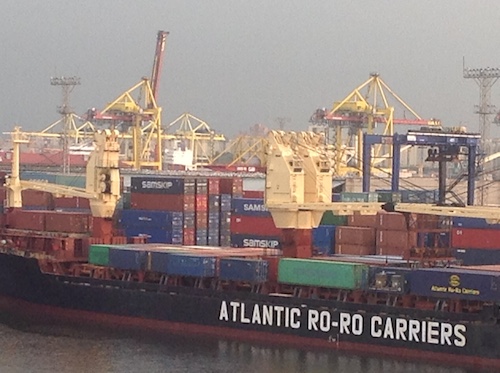
The Port
This city was also constructed for two very clear purposes. The general view that prevails in Russia is that this is the country’s window on the west, which, in many ways it is. However, the port faces the Baltic, which freezes in winter, so this is only a partial window, and one that can only be used either during the ice-free months, or with the help of ice-breakers. But, let’s face it, Peter the Great was a military man, and back in the eighteenth century the big issue in the region was an expanding military power in Sweden. St Petersburg may have been built in a damn silly place (on marshland) but the real reason was to counter that threat.
Obviously Peter’s plans paid off. From this new military garrison town Russian troops swarmed across the Baltic regions and sorted out the Swedes, and burnt Helsinki to the ground. He then turned to making his new city the capital of all the Russias, and this place was certainly built to impress. It has palaces by the dozen, and they are all substantial. I came out the back door of the Mikhailovski palace into the gardens. Unfortunately, they were erecting some marquis and the area was cordoned off. The grounds are so extensive they completely shut out any view of the suburbs of the city. In order to get round to the front I had to walk about three-quarters of a mile. These palaces are huge. The tsar had several of course.
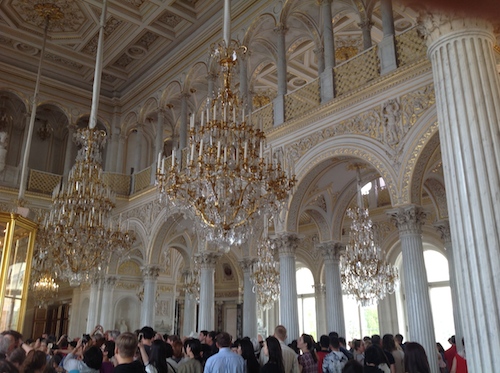
Catherine the Great's private rooms in the Hermitage
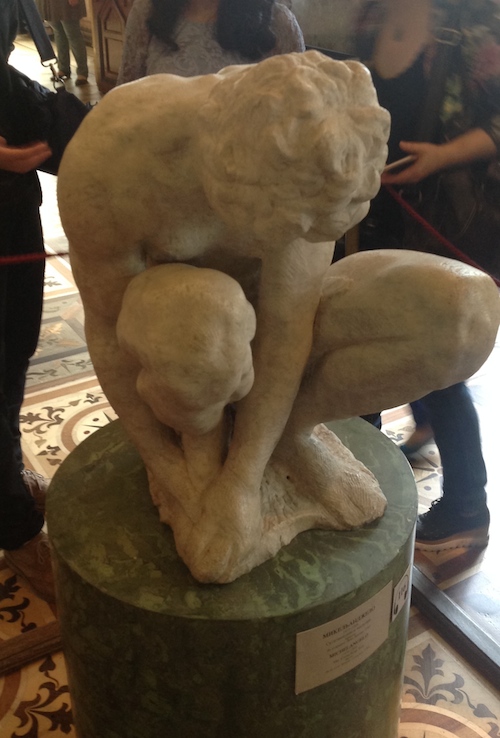
A Michaelangelo: Crouching Boy
But never mind the palaces; guide books can deal with them, likewise the Hermitage, which was originally another palace. I was more interested to see how Russia has changed since I was first there back in the early seventies.
The centre of the city contains several parks, but what was noticeable for someone who has been away for so long is the lack of chess players. Where the parks in the old days contained seats and tables set with chess boards, now there is no sign of them at all.
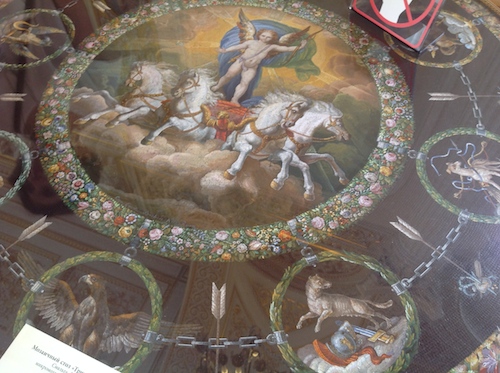
Inlaid table
The other great change is in the food available. The menus of all the restaurants I visited way back were maybe a dozen pages long with a massive list of options. The list read like a fairy tale. Unfortunately, the conversation with the waiter usually went like this: “Hey, that sounds great. I’ll have this.” The impassive face didn’t change, the head shook from side to side. “Is not on menu today.”
I looked down the page, and pointed to another delicacy. The expression didn’t change. “Is not on menu today.”
Somewhat ruffled we tried a few other options. Every selection ended with the repeated sentence: “Is not on menu today.”
I threw down the bulky menu. “What is on the menu?’
“There is goulash.” This was followed by an impassive silence. Clearly there was only one dish on the menu. If I’m offered goulash once more in this country I will stand on the table and scream. Clearly the waiter was waiting for me to do just that. When it became clear that I wasn’t going to scream he went on. “There is cabbage soup.”
I waited. Reluctantly he went on. “We have eggs.”
“But if you have eggs, surely you have chickens?”
The waiter wagged his finger. “If we eat the chickens we have no more eggs.” This statement was so obviously logical that I was stumped for a reply. As everybody knew, the Russian empire would collapse if there were no eggs to eat. Reluctantly I sat and waited for the goulash.
I was once told that there were never any potatoes on a restaurant menu because all the potatoes were used to make vodka.
This business with the food seemed to symbolise the Russian psyche. The menu presented the dream of Russia. It presented what could be. It symbolised the greatness of Russia. It was almost as though these documents were reminders of what once had been. Now Russia had fallen so low, all that was available was cabbage soup, and a dish made by someone who had once been to Hungary.
These days things have changed quite drastically. I have no experience of the countryside but the restaurants in St Petersburg that I ate in were excellent. No matter what I asked for, they had it. The menus have shrunk, but at least everything on them is available. We stopped in what looked like pretty average eating establishments on the streets. The food was cooked properly, and tasted superb. We chose traditional recipes, and found the price of food and drink to be very reasonable.
Even the fancy restaurant called The Dostoyevsky (just a couple of doors from my hotel) was not that expensive, although we didn’t eat there I did pinch a menu. They had an intriguing selection of meals based upon the paintings of Kandinsky. Items were chosen by their colours, then cooked, and presented in such a way as to mimic the lines of a particular abstract painting.
My last meal in St Petersburg consisted of a rather nice honey-glazed poussin, with some perfectly cooked egg plant, and a row of tomatoes cooked on a thread of thyme. It cost a little under £5. And I drank a bottle of Bombadier ale with it. Nice. I’m glad to see the Brits are at last selling their real ales abroad. About time too. Someone has to stop the dreadful march of lager.
The people are charming. I am aware that there are all sorts of problems. Every shop has a security guard, so pilfering is presumably rife, although we found, admittedly in a very short stay, that everyone seemed to be honest, helpful, charming, but decidedly poor. Everywhere we went we were met with smiles, very often rather shy smiles. People were not only willing, but eager to talk to us about themselves, and their country. Obviously many people are doing well as they drive relatively expensive cars, but the majority of the population are on low wages. One waiter admitted to earning roughly €15 a day. Next door in Finland folks tend to earn €15 an hour. It’s quite some difference.
Despite this, people are clearly managing very well. A lot of the guys are embarrassingly tall (I’m not exactly tall myself, more sort of Ryanair sized if you see what I mean). And the girls are wearing brightly coloured dresses, or ruthlessly torn jeans, and they decorate the streets as sweetly as in any European metropolis.
One other thing that has not changed since the late middle ages, the tea ritual is still in vogue. In the afternoons you will often see a group sitting at a table with the tea pot (are the samovars now a thing of the past? certainly they are in St Petersburg). A glass of tea is just as prevalent as a glass of beer.
My friend was initially worried about customs. Admittedly it does take rather a long time getting in, but only because passport control looks at you rather a lot to make sure you really are the person in the passport photo, and then there is a short form to fill in. It doesn’t take that long, but when there are two hundred of you just disembarking it builds up. It doesn’t pay to be at the back of the queue. Customs? I must have missed them, but it is a long time since I’ve seen a customs officer anywhere.
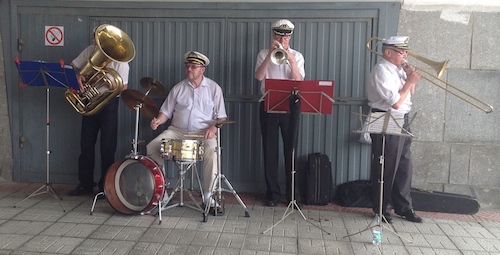
A nice farewell
This is a world class city. You need a month to luxuriate in it, and I have told you hardly anything. Next year I shall be back for the White Nights. I’ll see you then. And next time I’m staying, and you can expect a whole book.
…to be continued
john
< < < Varna
|
Subscribe
to our email alerts on the housing markets both
in the UK and abroad.
|
HTML Comment Box is
loading comments...
Podcasts: